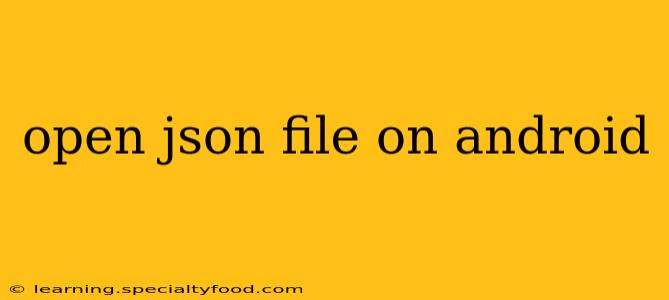Opening JSON Files on Android: A Comprehensive Guide
Opening and parsing JSON files on Android is a common task for developers interacting with web services or storing structured data. This guide will walk you through the process, covering various methods and best practices to ensure efficient and robust handling of JSON data. We'll address common questions and scenarios to make this process straightforward.
Understanding JSON
Before diving into the code, let's briefly review what JSON (JavaScript Object Notation) is. It's a lightweight data-interchange format that's easy for humans to read and write, and easy for machines to parse and generate. JSON data is typically structured as a collection of key-value pairs, similar to a dictionary or hash map. This makes it ideal for representing structured data in a format easily transferable between systems.
Methods for Opening and Parsing JSON Files on Android
Android provides several ways to handle JSON files, each with its own strengths and weaknesses:
1. Using org.json (For simpler JSON structures):
The org.json library is a lightweight option suitable for parsing relatively simple JSON structures. It's included in Android Studio projects, meaning you don't need to add any external dependencies.
try {
String jsonString = loadJSONFromAsset("your_file.json"); //Function to load JSON from assets folder (see below)
JSONObject jsonObject = new JSONObject(jsonString);
String name = jsonObject.getString("name");
int age = jsonObject.getInt("age");
// ... further processing ...
} catch (JSONException e) {
e.printStackTrace();
}
Note: You'll need to create a function loadJSONFromAsset to read the JSON file from your assets folder (explained later).
2. Using Gson (For complex JSON structures and convenient object mapping):
Gson, a popular Java library by Google, offers more powerful features, particularly for mapping JSON data to Java objects. It handles complex JSON structures efficiently and simplifies data extraction. Add the Gson dependency to your build.gradle file:
dependencies {
implementation 'com.google.code.gson:gson:2.10.1' //Or latest version
}
Then, parse your JSON:
Gson gson = new Gson();
String jsonString = loadJSONFromAsset("your_file.json");
MyDataObject myData = gson.fromJson(jsonString, MyDataObject.class);
//Access data using myData.name, myData.age etc.
//You need to create a matching MyDataObject class.
Creating a matching MyDataObject class is crucial for Gson's object mapping. The class should contain fields corresponding to the keys in your JSON.
3. Using other libraries (For specific needs):
Other libraries, such as Jackson, offer alternative approaches with distinct advantages depending on your project's specific requirements and complexity of the JSON data.
Loading JSON from Assets Folder
To load the JSON data from your Android project's assets folder:
private String loadJSONFromAsset(String filename) {
String json = null;
try {
InputStream is = getAssets().open(filename);
int size = is.available();
byte[] buffer = new byte[size];
is.read(buffer);
is.close();
json = new String(buffer, "UTF-8");
} catch (IOException ex) {
ex.printStackTrace();
return null;
}
return json;
}
Remember to place your your_file.json in the app/src/main/assets folder of your Android project.
Frequently Asked Questions (FAQs)
How do I handle errors when opening or parsing a JSON file?
Error handling is crucial. Always wrap your JSON parsing code in try-catch blocks to catch IOException (for file reading issues) and JSONException (for parsing errors). This allows you to gracefully handle potential problems and prevent app crashes.
What's the best library to use for JSON parsing on Android?
The choice depends on your needs: org.json is simple for basic JSON, while Gson provides superior features and object mapping capabilities for more complex scenarios. For extremely large or complex JSON, consider more advanced libraries like Jackson.
Can I parse JSON from a URL instead of a local file?
Yes. Instead of loadJSONFromAsset, you'll need to make an HTTP request to fetch the JSON data from the URL. Libraries like Retrofit or Volley are commonly used for this purpose.
How do I handle different JSON structures?
For varying JSON structures, you may need to adjust your parsing logic. Use conditional checks to determine the structure and adapt accordingly. Gson's object mapping significantly simplifies this when dealing with known structures.
My JSON contains nested objects. How do I access them?
With both org.json and Gson, you can access nested objects by chaining methods. For example, if you have {"outer": {"inner": "value"}}, you'd access "value" with jsonObject.getJSONObject("outer").getString("inner") (using org.json) or by creating nested objects in your MyDataObject class (using Gson).
This guide provides a solid foundation for handling JSON files on Android. Remember to choose the library and approach that best suits your project's needs and complexity. Always prioritize error handling and robust coding practices to ensure your app's stability and reliability.
